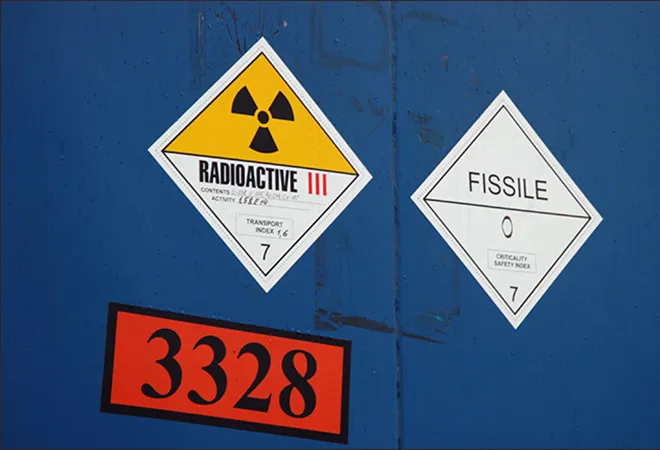
President Donald Trump’s dislike for the JCPOA — as presidential candidate he had promised to “rip up” the deal in his first day in office <1> — is not because Iran has been cheating on its obligations; on the contrary, since 2015, the IAEA has provided ten periodic reports certifying Iran’s compliance. Trump’s criticism is that the JCPOA is not good enough — he would like the nuclear restraints on Iran to be permanent rather than for only 10 to 15 years as provided under the JCPOA; Iran’s ballistic missile programme to be curtailed; and its regional involvement including in wars in Syria and Yemen ended. His argument is that the sanctions relief has provided Iran with USD 100 billion that can be used “as a slush fund for weapons, terror and oppression” in the region.
Pre-JCPOA sanctions are being reimposed over the next three to six months which will restrict Iranian oil exports, Iran’s ability to trade using the US dollar, and impose sanctions on companies dealing with Iran by blocking their assets and activities in the US.
Trump’s criticism is that the JCPOA is not good enough — he would like the nuclear restraints on Iran to be permanent rather than for only 10 to 15 years as provided under the JCPOA; Iran’s ballistic missile programme to be curtailed; and its regional involvement including in wars in Syria and Yemen ended.
Trump’s decision has been widely criticised by most countries with the exception of Israel and Saudi Arabia. Iranian President Hassan Rouhani has said that unless the deal can be salvaged by the other partners (France, Germany, UK, EU, China and Russia), Iran will resume its nuclear enrichment programme. So far, diplomatic negotiations have only produced expressions of political support for the JCPOA. Considering that Trump’s decision is a unilateral violation of UN Security Council Resolution 2231 adopted by consensus, the fact that none of the other P-5 members have raised it in the Security Council reflects the internal divisions and the limits to a coordinated response. Major European companies like Total and Airbus have already announced reviews of investments that were made under the deal.
The problem is that the US has not offered any alternatives to deal with Iran’s nuclear programme, the original reason that led to the JCPOA to begin with. Iran is a non-nuclear weapon state, party to the Nuclear Non-Proliferation Treaty (NPT) subject to full-scope safeguards. It has consistently maintained that its programme is peaceful as it considers nuclear weapons ‘haram’ and un-Islamic. However, it seeks to develop aspects of nuclear technology, including for power generation, enrichment and reprocessing technologies, subject to IAEA safeguards. Suspicions about Iranian activities including setting up of undisclosed facilities led to the assessment that Iran would soon be able to accumulate (possibly within three months) enough highly enriched uranium to produce one nuclear device.
The JCPOA froze all such activities for 10 to 15 years and imposed additional verification measures beyond full-scope safeguards in return for sanctions relief. It made Iran move from being the most sanctioned country to one whose nuclear programme was subjected to the most rigorous inspection regime. Under current circumstances, since sanctions relief will end, pressures will mount in Iran to terminate its onerous verification obligations. Some hardliners have even called for Iran to withdraw from the NPT.
The problem is that the US has not offered any alternatives to deal with Iran’s nuclear programme, the original reason that led to the JCPOA to begin with.
NPT is the cornerstone of the global non-proliferation regime but its internal inconsistencies are becoming increasingly visible. In terms of its non-proliferation objectives, it has reached the limits of its success. Only three countries have never joined it (India, Israel and Pakistan) and one country has withdrawn from it (North Korea). However, on the disarmament front, the NPT has failed to even begin a negotiation as mandated by Art VI. This growing frustration led more than 120 countries, all parties to the NPT, to conclude a Nuclear Ban Treaty in 2017.
More significant is the fact that since the NPT was negotiated 50 years ago, nuclear technology has matured. To control its spread, major powers have used informal mechanisms like export control regimes to restrict access to nuclear materials and dual-use materials and technologies by hyping up the proliferation threat. More relevant is the fact that during the last decade, major powers have embarked on a process of nuclear modernisation. New reviews indicate that new roles and doctrines for more usable nuclear weapons are being developed. With growing divergences among major powers, the prospects for arms control have disappeared.
In addition, there are regional issues as well. If Iran recommences enrichment, Saudi Arabia has said that it will seek the same rights from the US, too. The possibility becomes real of Pakistan giving a helping hand in return for Saudi largesse (past and ongoing) especially if the US is willing to turn a blind eye to it (as it did when China proliferated nuclear and missile technologies to Pakistan).
At the heart of the NPT is an inconsistency: it delegitimises proliferation but legitimises nuclear weapons in the hands of five countries. As long as there was convergence among major powers, the inconsistency could be covered but growing divergences and evolving technology make it difficult. The US’ exit from JCPOA may just be the last straw that breaks the camel’s back.
This essay appeared in the ORF Special Report ➔ Beyond JCPOA: Examining the consequences of US withdrawal.
<1> Tracy Wilkinson, “The Iran nuclear deal that Trump once vowed to tear apart is holding — at least for now,” Los Angeles Times, 19 April 2017.
The views expressed above belong to the author(s). ORF research and analyses now available on Telegram! Click here to access our curated content — blogs, longforms and interviews.




 PREV
PREV


